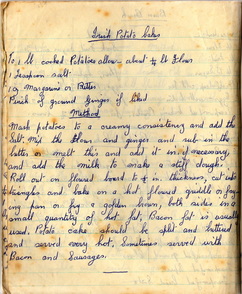
This is my granny's recipe for Irish Potato Cakes. Knowing the right recipe is key to creating great food, but did you realize that every great movie, novel, play, and short story also has a recipe?
Even though they all differ, great fiction starts with the same basic ingredients.
Somebody (character) wants (desire) because (motive) but (obstacle) so (plot points #1, 2, 3....)
Great stories have unique characters with a strong desire and solid motive -- that’s a great start. Once you put obstacles in their way, the story gets even more interesting.
Think about some of our favourite stories:
- Katniss wants to win the Hunger Games because she’ll die if she doesn’t but that means killing her friend, Peeta so they work together to change the games.
- Frodo wants to destroy the ring because it’s evil and will destroy Middle Earth but the evil ring is turning even friends against him, so he tries to carry it alone.
- Harry wants to belong and be loved because he is an orphan, but but he is also a wizard, so he tries to hide his magic skills to fit in with the only family he’s got, the Dursley’s.
Try applying this recipe to your story. Does it work? If you can sum it up according tho this recipe, you’ve got all the necessary ingredients.
A story is like a cake. Each one has the same basic ingredients, yet every one is different. Some are multi-layered, others are short and sweet, and some are just plain nutty. They also vary in flavour and purpose. You might love horror or hate romance, or perhaps mystery is more to your taste. You can personalize your story by how you decorate it:
- How much detail will you sprinkle in?
- Will you add a huge dollop of dialogue or not?
- Are you big on sensory description and ornate words -- or do you prefer to keep it simple?
- You even get to decide how you divvy out your plot. How will you shape your story?
- How will you serve it -- will we dive into the middle or be spoon-feed us one dramatic clue at a time?
All of those things are part of your style, your flavour -- your voice. You are the author and there is no right or wrong way to tell your story. What way feels right for you? Be creative, be flamboyant, be playful. Try it a few different ways and go with the one you like best. Trust your gut and it will help you tune in to your voice.
Just make sure you’ve got all the ingredients. You might write five full pages. You might use fantastic description and detail that stir our senses and imagination. But if you don’t have your basic ingredients of character, motive, conflict, climax and resolution -- it’s not a story. Period.
Double-check the recipe. Make sure your story has:
Someone who wants something. (That’s what drives your character.)
A reason they can’t have it? (That’s conflict and obstacles)
What are they going to do about it? (That’s plot.)
Will they be satisfied? Maybe they’ll be changed. Or perhaps they get what they deserve. (That’s resolution.)
 RSS Feed
RSS Feed